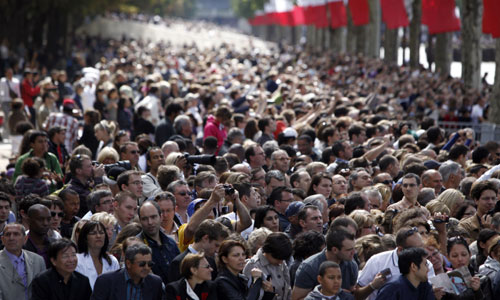
In France, Germany, and Greece this weekend, voters rejected political parties that have pushed for austerity, and voted in lawmakers who campaigned for policies of economic stimulus and growth.
“Europe is watching us, austerity can no longer be the only option,” declared the victorious Socialist and President-Elect Francois Hollande to cheering crowds at the Bastille in Paris. Hollande ousted the center-right incumbent Nicolas Sarkozy with a 52 to 48 percent margin in an election that saw 80 percent of the voters turn out.
The new Socialist president has promised to raise taxes on big corporations and persons earning more than 1 million euros a year. He has called for an increase in the minimum wage, hiring 60,000 more teachers, and lowering the retirement age from 62 to 60 for some categories of workers.
He has promised to rework a deal on government debt in eurozone countries to focus on promoting growth.
The conservative Sarkozy is the first French president since 1981 not to win a second term.
Jubilant Hollande supporters gathered at the Place de la Bastille in Paris – a traditional rallying place for the left – to celebrate. Hollande is the first Socialist to win the presidency since Francois Mitterand in the 1980s.
“I am the president of the youth of France,” he told the hundreds of thousands gathered at the Bastille. “You are a movement that is rising throughout Europe.”
In Germany, meanwhile, the parties in Chancellor Angela Merkel’s center-right government lost control of the northern German state of Schleswig-Holstein. Merkel’s Christian Democrats had 30.9 percent, the party’s worst results in the region in five decades. The CD’s coalition partner, the pro-business Free Democrats, were also routed by the voters who gave them just 8.2 percent of the vote, down from 14.9 percent in the last elections.
The biggest gains were made by the opposition Social Democrats, who secured 30.4 percent and the Greens, who secured 13 percent. With support from the Danish-speaking minority party, which secured 4.6 percent of the vote the three may be able to put together a center-left coalition with 35 seats in the 69 seat state legislature. The new Pirate Party won 8 percent so it will have seats in the parliament. No one knows for sure however, beyond unlimited access to the Internet, what the Pirates actually stand for and where they would fit in the process of forming a government.
The ballot in Schleswig-Holstein, however, was a key test for Merkel. Elections are coming May 13 in North-Rhine Westphalia, Germanys’ most populous state where polling shows the Christian Democrats could go down to defeat again.
In Greece, voters angry over more than two years of austerity measures and the misery resulting from them punished the two ruling parties associated with those measures, New Democracy and PASOK.
New Democracy won 108 seats in the 300-member parliament, far short of the 151 needed to form a government and the anti-bank bailout left-wing Syriza (Radical Coalition of the Left) won 51 seats. The former ruling party, PASOK, fell to third place, winning only 41 seats.
Syriza leader Alexis Tsipras said the pounding taken by New Democracy and PASOK, which had signed Greece’s loan agreements, meant “their signatures have lost legitimacy by the popular vote.”
“The people,” he said, “have rewarded a proposal made by us to form a government of the left that will cancel the loan agreements and overturn the course of our people toward misery.”
But the way forward to a government is not clear. Reportedly, big banks were alarmed by both Syriza’s statement and the elections that preceded it.
Photo: Hundreds of thousands celebrated the Socialist victory at the Bastille, the traditional gathering place of the Left – in Paris. Thibault Camus/AP












Comments